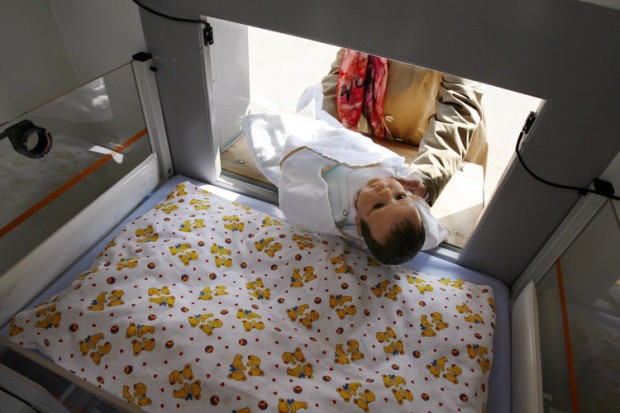They have been found in places where no newborn baby should ever be left: a trash can at a Phoenix middle school, in the New York City subway, in the toilet of a North Carolina circus, on the floor of a Lawrence, Kan., laundromat and along hiking trails in California and Texas.
Videos By Rare
Abandonment happens because the baby’s mother is either absent, impaired or simply unprepared to be a parent.
There are no firm statistics of exactly how many American babies are abandoned every year or how many are harmed or die after being left in a vulnerable place. States that might bother to keep such figures have no national database in which to deposit their sad statistics.
Any member of law enforcement will tell you that it’s one of the most heartbreaking crimes they see. Even the most seasoned detectives are reduced to tears when they get such a call. Who could do such a thing to such a defenseless infant?
Every state in the U.S. now has some sort of so-called “safe haven” law that allows parents to drop off unwanted newborns at specific hospitals, police or fire stations without repercussion. Yet there are still many parents who, in their panic or desperation, commit the felony of abandoning their babies. Some of those babies die needlessly as childless couples wait years to adopt.
Maybe it is time for America to look elsewhere for solutions.
In Germany they have what are called, “babyklappens” (translated: baby hatches). In South Africa they call them ‘baby bins.” And in the last few years, they’ve begun to appear in Russia, Poland, Japan, Italy, the Czech Republic, Malaysia and Hungary.
On the street, one finds a small door that opens to reveal a cozy, heated bed in which the baby can be placed. A silent alarm alerts adults inside when a baby arrives, and they respond within minutes. Literature left on the bed informs whoever is leaving the newborn how long they have to change their mind and who to call in case they do. Once closed, the door cannot be reopened from the outside and the mother remains entirely anonymous. It’s an attractive side benefit to those who aren’t strong enough for a face-to-face surrendering of their baby. Once inside on the heated bed, the baby is cared for by medical professionals and ultimately enters the adoption system.
There is no doubt these baby hatches save vulnerable lives, and American cities and states should consider installing them to augment our current system. Although teenage birth rates are down in America (across all racial and ethnic groups), 31 teen girls out of every thousand still become mothers.
A word of warning, though. There is a controversy about babyklappens that centers around a child’s right to know his or her parents. Germany’s constitution, for example, guarantees the right of each citizen to know about their origin. German fathers are also specifically granted the right to be part of their child’s upbringing.
These so-called “confidential births,” where newborns can be anonymously given away, flies in the face of those rights. Some firmly believe a child should be given the ability to find their parents later in life, if for no other reason than to obtain health history information. Other critics complain the baby hatches present an easy way out for the irresponsible who don’t act to prevent pregnancy in the first place, putting the burden on the state to care for their “mistake.”
The United Nations has also gotten in on the criticism. The U.N. Committee on the Rights of the Child maintains the drop locations actually violate the rights of the very child they are supposed to be helping. How so? The committee says that because no documents naming the mother and father are required at the point of surrender, the U.N. mandate that every child has the right “to be known and cared for by his or her parents” is violated.
You know what? Those concerns would be important if we lived in a perfect world. But we don’t. That U.N. decree applies to war-torn areas where children are forcibly separated from their parents. And there are different ways for a person to determine their health history, like DNA and other lab testing. Fathers can petition the authorities for their rights if their baby suddenly turns up missing after he or she has been given away.
But if a newborn’s desperate mother decides to toss the child in a river, tie him or her up in a plastic bag or perform a murder before committing their own suicide, there is no recourse. It is simply too late.
I submit that saving the life of a child is far more important than ensuring every child knows who his or her birth mom and dad were.
Why wouldn’t we want to open up the American version of babyklappens? I’m sure there are plenty of nonprofit organizations that would help raise the funds and provide the necessary staff to operate these lifesaving pods.
It annoys me that the right thing to do is so often clouded by a chorus of “what-ifs?”
Let me turn the table on the critics’ arguments. What if defenseless and unwanted babies were saved and nurtured by caring people? And what if, when the time was right, those babies were placed with responsible and adoptive adults who would love them unconditionally?
What could be more important to achieve than that?
© CREATORS.COM

